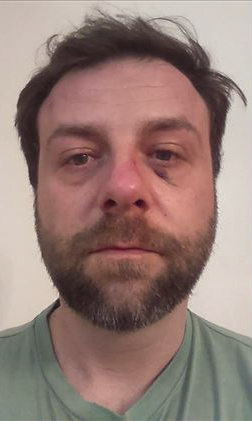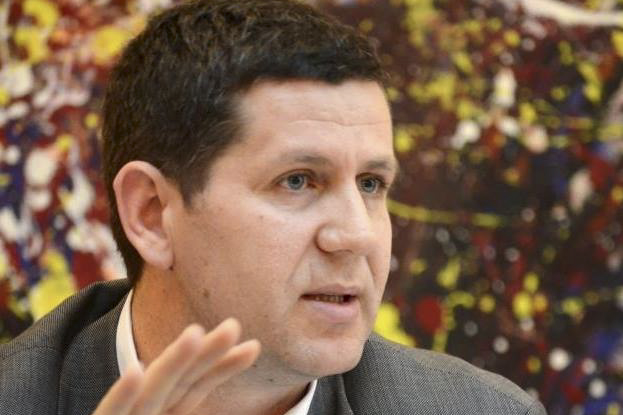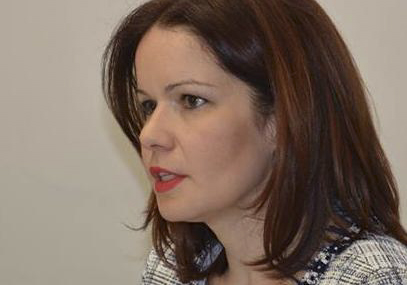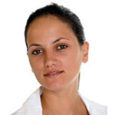When Dimitar Tanurov, reporter from the online news agency Meta.mk, was rushing toward the Macedonian parliament in April this year to report about the ongoing incident he never thought that snapshots of his soon to be injured face would become the news. The journalist was taking pictures of the dramatic scenes inside the parliament after about 200 demonstrators, many of whom were wearing masks, stormed the Parliament and attacked MPs.
Shortly after his arrival Dimitar Tanurov was attacked. He was beaten by a group of protesters, who called him a traitor after his press card gave away his profession.

Macedonian police have identified only one of his five attackers, says Dimitar Tanurov. Photo courtesy of Dimitar Tanurov.
Tanurov suffered multiple head and face injuries, but looking back at the events of that night he considers himself lucky to have escaped without more serious trauma, unlike MP Zijadin Sela, who was dragged, blood streaming from his face, across the assembly floor and was later hospitalized in the intensive care unit.
Waiting for justice
Tanurov explains that the suspect for his attack has been in custody, but under suspicion of something else — for the violence that erupted in the Parliament, where several other MPs, including the leader of the Social Democrats and now prime minister, Zoran Zaev, were also injured. He points out that investigative failings have led to the delay in proceeding with prosecution in his case.
“Although I described that I was attacked while exercising my professional duty as a journalist in the Parliament, the police categorized the offence as a robbery because the attackers stole my phone,” explains Tanurov, who is still waiting for a trial to begin.
“Several days after the attack I provided photos of the attacker, which had been released in the media, but I was called to identify the attacker only last month,” he adds. “I recognized two other attackers from the recordings seen on TV. However, I don’t know if they have been arrested.”
Tanurov is one of several journalists that had suffered verbal or physical assault over the last few months of the political crisis, which culminated in the events of April 27.
In the last four years The Association of Journalists of Macedonia (AJM) have enumerated about 50 other journalists in the country whose rights have been violated by physical and verbal assaults or by being denied the right to report. The president of the association, Naser Selmani, points out that only 10 cases have resulted in a court procedure. “Solving the cases that include journalists’ attacks would be a test for the government’s willingness to push for media reforms,” he underlines.

Naser Selmani, president of the Association of Journalists of Macedonia, believes that the media are more relaxed than during the time of Gruevski’s government. Photo courtesy of Naser Selmani.
Naser Selmani, president of the Association of Journalists of Macedonia, believes that the media are more relaxed than during the time of Gruevski’s government. Photo courtesy of Naser Selmani.
But, attacks and harassment against journalists are only one piece of the big puzzle, which illustrates the challenges obstructing media freedom in Macedonia.
The country’s press freedoms score in Freedom House’s annual Freedom of the Press report has been plummeting since 2010 and this year, for the second consecutive year, was described as “not free,” a ranking that reflects a media landscape that is deeply polarized along political lines. Now, many are hoping that a turn for the better will come with the newly elected government.
Since the period of political turmoil ended, all eyes have been on Prime Minister Zaev’s government to see how it will respond to the challenge to improve the climate for media freedoms. Expectations are high as journalists have long worked in a hostile climate. The wiretapping scandal also revealed that Nikola Gruevski’s government illegally eavesdropped on around 100 journalists and that many media figures were being monitored.
“The media environment is more relaxed, which certainly doesn’t mean that media freedom has improved,” says Biljana Petkovska, director of the Macedonian Institute for Media. “Press freedom is best measured outside the election process, so I expect a clearer picture in the time to come.”

Biljana Petkovska, director of the Macedonian Institute for Media, says that the current relaxed atmosphere doesn’t mean that media freedom is improved. Photo courtesy of Biljana Petkovska.
Biljana Petkovska, director of the Macedonian Institute for Media, says that the current relaxed atmosphere doesn’t mean that media freedom is improved. Photo courtesy of Biljana Petkovska.
So far, the new administration has halted the advertising program of the former government, whose multimillion budget warped the market and made most media financially dependent upon public funding.
Changing media environment
The former government, under Nikola Gruevski’s rule, had fanned the flames in media freedom by spending 23 million euros between 2008 and 2015 on government advertising in electronic media. But will cutting the umbilical-fiscal cord be enough to halt the clientelistic practices between media and the politicians?
“Media are more relaxed than under the pressure that was previously imposed by Gruevski’s government,” Selmani says.
However, he believes that simply changing personnel in government does not in itself constitute meaningful change. “If the pillars of the old corruption system are not toppled, the new government will show that it supports it,” he explains. “A media free from government interference is one of the key components.”

